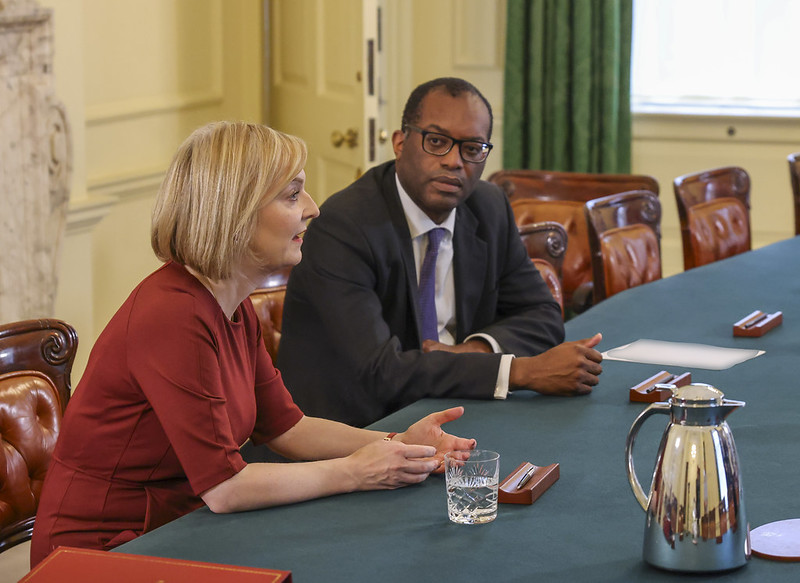Arguably, we now live in a country that has fallen behind many of its counterparts in the way that it addresses the economy. In recent months we have seen France, and now Germany, reassert state power to nationalise and secure energy for their future, whilst President Biden has taken aim at the logic of trickle-down economics that has been the backbone of U.S. economic policy for much of the past forty years.
Meanwhile, Liz Truss has declared that she is prepared to be unpopular as a leader and does not even deny that she wants to make the rich even richer. Truss’ Chancellor, Kwasi Kwarteng, in his now infamous, bond-tanking mini-budget has promised tax cuts, the reduction of National Insurance contributions, and a series of other moves that will see 660,000 of the highest earners save £10,000 in tax, and where half the gains go to the richest 5%, with elites expected to pocket an additional £8560 on average compared to this time last year.
This is not all: the country is expected to finance this transfer of wealth in the medium-term as the country looks to borrow a further £411bn over five years. The predicted impact of this is not only to accelerate the upwards transfer of wealth, but also to leave most working people no better off. In fact, as this occurs, during the worst squeeze to our cost-of-living for decades, we see a budget that offers comparatively little to those that need a pay rise most. Low-earners are expected to be £7.60 better off per year because of cuts in the National Insurance rate, whilst those earning an average wage of £25,000 a year will be just £125-280 better off after the basic rate of tax is slashed by 1%.
What we are seeing is something two-fold. First, a blatant disregard for the livelihoods of ordinary people thanks to a budget that promises to cut tax rates for the rich before considering any serious support for ordinary citizens at this time and, second, a commitment to borrowing which is likely to be used to patch over the failures of our economic model. Indeed, the modest cap to energy costs of £2500, still £1200 higher than this time last year, is now expected to be paid for out of this £411bn of borrowing.
The problem is not borrowing however, rather it is the reason for it. This borrowing, which would typically be used to finance public works and other projects for growth, is being used to underwrite tax cuts for the wealthy and to replace the lost revenue which would usually go to fund the state’s core services, like the NHS. What we see here is then a form of borrowing which would not be necessary if these cuts were not passed, and which do not stimulate growth in the way that it has typically done in the past, all the while benefiting many of those responsible for hiking up prices on essential goods and utilities. Such financial recklessness has been cited further as a reason for the pound dropping to its lowest level in 37 years.
What this all amounts to is a realisation that we teeter on the brink of economic meltdown as the government commits to a plan for trickle-down economics that promises ideological tax cuts funded by borrowing, to promote a growth that both the LSE and a wealth of scholarly and economic evidence highlights as elusive under such economic models.
Yet, we may look elsewhere for inspiration. We have seen both Germany and France nationalise energy companies, taking the strain off of their publics with only small increases in their energy prices. We should do the same. The TUC suggests a bill of just £2.85bn to nationalise our 5 largest providers, with potential savings to consumers of £2500. What this amounts to is a move which does not demand borrowing to reduce the tax burden of those companies and their corporate elite that are already going to extract some £170bn in excess profits.
Keir Starmer’s Labour Party have at least gone halfway towards this, promising a Great British Energy company that would be publicly owned – not unlike EDF in France. This is a modest position, and a welcome alternative to Truss’ plans. It could save U.K. households up to £4400 per year and put money back into the public purse through direct revenue. Such a plan’s potential should not be understated, and if we are not to nationalise energy wholesale, this intervention will nevertheless make a significant difference to those struggling, and go some way to ridding energy companies of the means to increase their profit margins.
What we are seeing in other countries, and finally under Starmer (despite his opposition to a full-scale nationalisation that might better hold exploitative elites to account), is a move that combines a commitment to economic stability with a desire to see those benefits passed onto the public. Instead of rewarding elites with tax cuts, we could be taking measures to help our citizens, and to secure our long-term future in terms of both government funding and utility costs. Our neighbours have led the way, borrowing to alter their economic superstructure for the better. We should be doing the same; using state power to protect working people, instead of rewarding further those that have already profited most.


